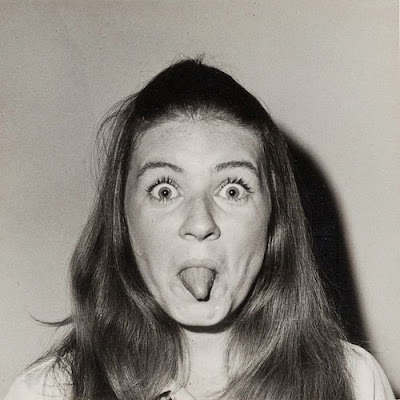 |
| ♫ ♪ ♫ Meet Cathy, who’s lived most everywhere… ♪ ♫ ♪ |
It’s way past due to create another Unpacking The Writer, my almost-monthly behind-the-scenes look at what’s happening here in the Not Now Silly Newsroom. But, I’m just not feeling it right now.
It’s not that I have nothing to say. It’s that I have far too much to say and — already having the basic outline of this essay in my head when I begin — wonder how much I really want to reveal.
This past week I have been incredibly out of sorts and feeling quite blue. It started when I learned that Garry Shandling, one of the greatest comedians ever, had died at the age of 66. Then came the news that Patty Duke died at 69. I’m 63. Both deaths were body blows for different reasons and I have never felt quite so mortal as I do right now.
I was such a big fan of Shandling’s, starting with his earliest appearances on the Tonight Show with Johnny Carson. His skewed outlook seemed to perfectly match my own.
Then, in 1986, he created (with Alan Zweibel) “It’s Garry Shandling’s Show”, one of the greatest “sitcoms” in tee vee history. I have always delighted in comedy that breaks the 4th wall. It gives me a special thrill. Groucho would occasionally turn to the camera to make remarks directly to the theater audience; Green Acres put the opening credits on laundry that Lisa Douglas was hanging up; George Burns not only talked to his audience, but had a magic tee vee on which he could keep up with continuing plot points as he talked to us; and Woody Allen dragged Marshall McLuhan into a movie line-up to excoriate the pontificating idiot standing in front of him.
“It’s Garry Shandling’s Show” not only broke the 4th wall, it destroyed it: Shandling played his nervously neurotic self, living on a tee vee set with a studio audience, but appears to live in a conventional suburb, with just the sort of goofy neighbours that inhabit every sitcom since the days when sits were first commed.
The day after learning of his death, I had to write my weekly Friday Fox Follies for PoliticusUSA. I try to inject as much humour into it as I can. Considering the overarching topic — the systematic destruction of my beloved career of Journalism at the hands of the Fox “News” Channel — it can often be an uphill battle. As I was doing last week’s final edit I realized that some of my writing — especially the things I want to stand out as humour — break the 4th wall of Journalism, if journalism is said to have any walls at all any more.
It also occurs to me that breaking the 4th wall is also the main purpose of Unpacking The Writer, this seemingly never-ending series in which I examine the entrails of my life to divine the future. At the same time I expose the entire enterprise to your prying eyes. I am aware I do this both for myself — because I will often learn things about myself I didn’t know when I started (and today is no exception) — and for your reading pleasure — if you get any pleasure out of it at all. Yet, I know from past experience that when I start to get too confessional, I begin to use the delete key liberally, holding back the most personal revelations because, after all, I’m really a coward. There’s only so much I really want to expose about myself to the world.
That’s why Patty Duke’s death hit me so hard. She was already a star when I was just a kid. Being about the same age it was easy to identify with her as identical twin cousins (how weird is that?) on The Patty Duke Show. And, she won an Academy Award. I didn’t see The Miracle Worker until years later, but it was easy to see why she won an Oscar for her performance, at the time the youngest person to have done so. In this teenager’s imagination, she seemed to have a charmed life.
However, it wasn’t until I read her book, Call Me Anna; The Autobiography of Patty Duke, did I learn of her struggle with bi-polar disorder. What an amazingly brave thing to have put out there for everyone to know.
I’ve not been nearly so brave. While Unpacking The Writer in the past, I’ve danced to the edge of talking about my own bouts of depression, but have always shied away from being explicit. Even now — as this paragraph gets pounded out and revised and heavily edited — I am keeping most of my recent self-discoveries to myself. However, I’m also aware I’m burying the lede. I’m stuffing this confession so far down this essay that only my most loyal readers will see it. Part of me hopes that most readers have given up by now.
 |
| Look at me! I am the 4th wall! |
Yeah, depression. I’ve been self-diagnosing myself my entire adult life.
There was a time in my life I referred to it as anhedonia, which incidentally was the original name for the movie Annie Hall. I thought of it as anhedonia because it was so even and level as to be like Florida, sea level as far as the eye can see. However, in the end, I rejected that definition because there are things I take pleasure in, like music, beautiful brass objets d’art, books, and relationships — just to name a few.
Later I came to think of myself as manic-depressive, because there are some days that I am incredibly up and enjoying life. Then I fall back into that steady norm that I once called anhedonia. Incidentally, the term manic-depressive is no longer used. The medical community calls it bi-polar these days, the same disorder as Patty Duke.
However, I also rejected bi-polar in the end. I’ve read a fair bit about it over the years, including some case studies, and I am fully aware that my highs are not manic and my lows are not like falling into the Marianas Trench, either.
For a number of years I tried to fool myself by calling it The Blues. Not all of us are all always happy, are we? That’s how I rationalized it. Yet, I know some people that never appear to be down and some who never appear to be up. At least I had moods. Yeah, that’s the ticket.
However, I stopped all of that self-delusional rationalization after I was finally diagnosed as having Depression. There it was. A doctor said so. There was no longer any way to ignore the fact that the serotonin in my head — or the lack of uptaking thereof — affects my entire outlook. For a few years I took some meds. Actually, at the beginning, I took a lot of meds, different meds. It took a while to find one that didn’t make me crazy, which is not an exaggeration. Then we had to adjust the dosage so I didn’t sleep most of the time. But, we managed to find the right balance.
In the end I quit the drugs altogether. They wrapped my brain in a kind of cotton candy that was hard to think through and absolutely impossible to write through. Since then I have self-medicated when I have the need and the money.
That diagnosis, BTW, was a good 14 or 15 years ago. I no longer think of myself as depressed because — really? — who wants to carry that around all the time? It’s heavy, man.
Heavier still: Over the years I’ve started to think of myself as human kintsugi. Kintsugi is the Japanese art of repairing broken pottery with gold, as opposed to how we do it here. Westerners try to restore pottery by concealing the repair.
Thinking of myself as kintsugi acknowledges that I have been broken and repaired — more than once, in fact. However, it also means that I am more fragile than I would be if I had never shattered.
There! I’ve said it. Do I feel any better for finally having been so confessional? Time will tell, but it’s a good sign that I don’t feel any worse. And, because music always makes me feel better, crank it up and D A N C E ! ! !



